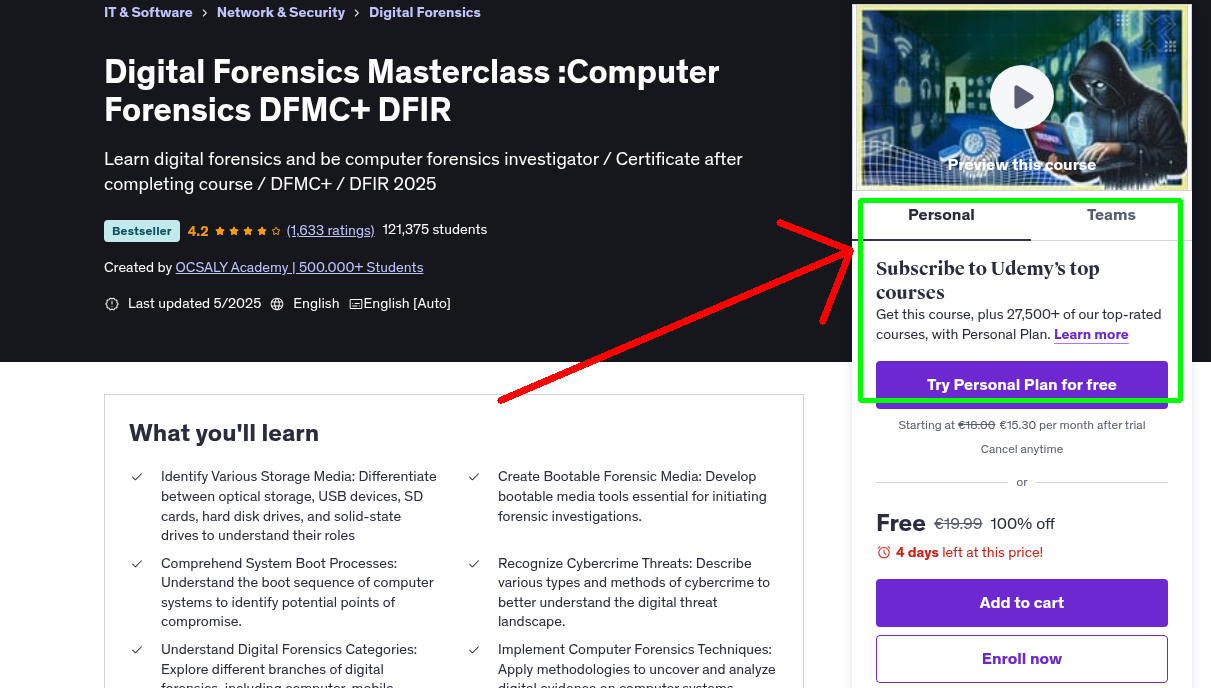
What You'll Learn
- Identify Various Storage Media: Differentiate between optical storage, USB devices, SD cards, hard disk drives, and solid-state drives to understand their roles
- Create Bootable Forensic Media: Develop bootable media tools essential for initiating forensic investigations.
- Comprehend System Boot Processes: Understand the boot sequence of computer systems to identify potential points of compromise.
- Recognize Cybercrime Threats: Describe various types and methods of cybercrime to better understand the digital threat landscape.
- Understand Digital Forensics Categories: Explore different branches of digital forensics, including computer, mobile, network, and database forensics.
- Implement Computer Forensics Techniques: Apply methodologies to uncover and analyze digital evidence on computer systems.
- Conduct Mobile Device Forensics: Investigate mobile devices to extract and analyze pertinent digital evidence.
- Utilize Mobile Forensics Tools: Employ the latest tools and techniques in mobile forensic investigations.
- Perform Database Forensics: Analyze databases to uncover digital evidence and understand data manipulations.
- Analyze Storage Media Evolution: Trace the history and development of various storage media to appreciate their impact on data storage.
- Differentiate Volatile and Non-Volatile Memory: Understand the characteristics and differences between volatile and non-volatile memory types.
- Explore Magnetic Tape Drives: Examine the functionality and significance of magnetic tape drives in data storage.
- Understand Floppy Disks: Gain insights into the role and operation of floppy disks as a data storage medium.
- Examine Optical Storage Media: Analyze the evolution and capabilities of optical storage media, including DVDs and Blu-ray technology.
- Explore Flash Storage Media: Investigate the benefits and applications of flash storage media in modern computing.
- Understand USB Flash Drives: Learn about the functionality and versatility of USB flash drives in data storage and transfer.
- Examine Flash Memory Cards: Understand the use of flash memory cards in various digital devices.
- Trace Hard Disk Drives Evolution: Study the development of hard disk drives from megabytes to terabytes.
- Analyze Solid State Drives: Delve into the architecture and advantages of solid-state drives as the next generation of data storage.
- Understand Network Protocols: Comprehend the function and importance of network protocols in digital communication.
- Explore TCP/IP Model Layers: Understand the layers of the TCP/IP model and their roles in network communication.
- Analyze Email Transmission: Learn how emails are sent and received over the internet, including underlying protocols.
- Utilize Network Devices: Understand the basic use of switches and routers in data transmission and network connectivity.
- Implement Incident Response Strategies: Develop and apply systematic approaches to effectively respond to and manage cybersecurity incidents.
- Analyze Malware Behavior: Utilize advanced tools and techniques to dissect and understand malicious software, enhancing threat mitigation capabilities.
- Conduct Network Traffic Analysis: Monitor and interpret network data to identify anomalies and potential security breaches.
- Apply Legal and Ethical Principles in Digital Forensics: Understand the legal frameworks and ethical considerations governing digital investigations to ensure c
- Develop Threat Intelligence Reports: Compile and present findings from digital forensic investigations to inform stakeholders and support proactive defense .
- and other awesome topics ->
Requirements
- Basic understanding of computer systems and networks is beneficial but not mandatory.
- A keen interest in cybersecurity and digital investigations.
Who This Course is For
- Students and Academics: Pursue a comprehensive understanding of digital forensics for academic or career purposes.
- Legal Professionals: Gain insights into the technical aspects of digital evidence to support legal cases.
- Computer Forensics Investigator
- Law Enforcement Officers: Acquire the technical expertise to investigate and solve cybercrimes effectively.
- Cybersecurity Professionals: Enhance your skill set with advanced digital forensic techniques.
Your Instructor
OCSALY Academy | 550.000+ Students
Join 550,000+ happy students from 165 countries and beyond !
4.2 Instructor Rating
15,346 Reviews
556,598 Students
27 Courses
Never Miss a Coupon!
Subscribe to our newsletter to get daily updates on the latest free courses.



